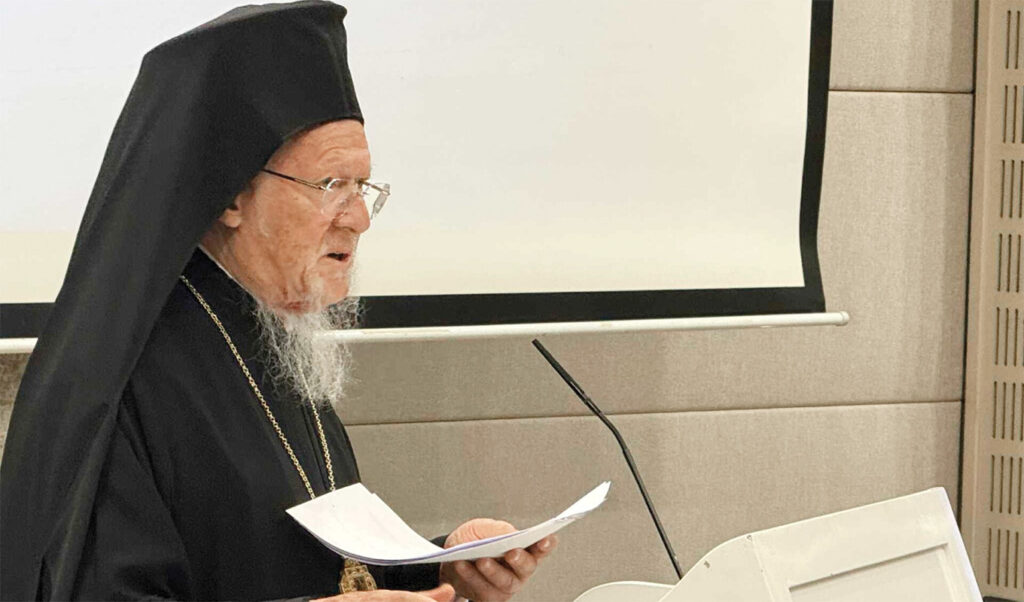Ecumenical Patriarch Bartholomew was the keynote speaker at the opening ceremony of an international meeting of over 60 religious leaders for peace, held today, Tuesday, July 29, in Constantinople. The event is organized within the framework of the World Council session of “Religions for Peace,” hosted by Metropolitan Emmanuel of Chalcedon, one of the key coordinators of the initiative. The meeting’s agenda includes critical global issues such as addressing the international debt crisis, promoting ethical and responsible development of artificial intelligence, and the innovative Shared Sacred Flourishing (SSF) initiative – a global cooperation framework uniting religious communities to strengthen peace, social justice, and reconciliation.
Specifically, during his opening address, Ecumenical Patriarch Bartholomew emphasized that in view of the danger of spiritual desolation, “interfaith dialogue emerges not merely as theological engagement or a luxury of peaceful times, but as a relentless necessity, as an act of collective resistance. The meeting of different religious traditions, each bearing a unique experience of the Sacred, becomes the essential prerequisite for confronting globalized meaninglessness, for re-articulating a discourse that dares to speak of love, compassion, mercy, forgiveness, and self-sacrifice not as abstract moral values, but as active elements of a fuller reality.”
“The response proposed to this existential challenge takes the form of an ambitious spiritual edifice: that of the ‘Shared Sacred Worldview,’ a framework that aspires to function as the theoretical foundation for ‘Shared Sacred Flourishing.’ This is not an attempt to create a new, syncretic religion, nor to replace the unique worldviews that characterize each religious tradition,” the Ecumenical Patriarch emphasized, clarifying that “the intention is to make clear a connection with the Sacred, which previously remained silent in interfaith initiatives, while allowing each tradition to maintain its distinct identity.”

Ecumenical Patriarch Bartholomew: Four fundamental pillars that constitute a holistic view of reality
Continuing his address, the Ecumenical Patriarch stated: “This framework is structured around four fundamental pillars that constitute a holistic view of reality. At the center is the Sacred itself, the absolute reality, which is expressed in various ways, as God, Allah, Brahman, or as the Luminous Void. This reality is not an abstract principle, but the foundation of the ‘community of being,’ which unites all things through Love, Compassion, and Mercy. Second, human beings are understood by definition as relational beings, precisely because they are grounded in the Sacred. Their capacity for fulfillment is not exhausted in protecting rights, but is realized through cultivating virtues, centered on freedom that springs from Sacred Love. Third, society is not a mere sum of individuals, but a ‘totality of whole persons,’ a structure of reciprocity between individuals and institutions of the common good – family, education, economy. Finally, the Earth and its network of life, whether considered sacred in themselves or expressions of the Sacred, are recognized by all traditions as grounded in the Sacred, requiring respect expressed through virtues like sustainable consumption and structures like renewable energy sources.”
Ecumenical Patriarch Bartholomew made special reference to challenges from global debt and artificial intelligence, saying that “if debt constitutes the material manifestation of dehumanization, artificial intelligence emerges as its digital specter.”
As he observed, “both global debt and artificial intelligence, despite their different appearance, stem from the same philosophical root: the deification of abstraction and utility. In the case of debt, the abstraction is money, disconnected from the real economy, which ignores the person of the debtor. In the case of artificial intelligence, the abstraction is data, which ignores the uniqueness of the subject. In both cases, the logic of utility, the pursuit of maximum efficiency, whether economic or computational, overrides all other values. This constitutes the deeper problem, the ideological core that must be addressed.”

Ecumenical Patriarch Bartholomew: Artificial intelligence is not simply a new tool
Artificial intelligence is not simply a new tool, according to Bartholomew, “it is the creation of a facade of human logic, an intelligence disconnected from consciousness, body, and spirit. While it promises unprecedented developments in medicine, education, and security, it simultaneously raises urgent ethical questions about bias, surveillance, inequality, and the erosion of human agency.”
Referring to the dangers that algorithms harbor for social justice, he commented that they “are trained with data that reflect existing social injustices, risk entrenching and reinforcing them, creating an invisible but omnipotent network of control that determines who has access to opportunities and who is excluded. Human judgment, with its nuances, intuition, and compassion, risks being replaced by the cold efficiency of the machine.”
“We are not called to compose a new global religion of consensus. We are called, each from the perspective of our faith, to form a global alliance of conscience, a prophetic witness that will keep open the horizon of transcendence in a world threatened with suffocation within the limits of the material. Our unity is not based on what we believe in common, but on our shared love for humanity and our common reference to the mystery of the one God. This is the only sustainable peace,” concluded Ecumenical Patriarch Bartholomew in his address.




